Serotonin is a chemical substance produced in your body- a hormone and a neurotransmitter. It is produced by nerve cells and influences several physical and psychological functions. These include mood, appetite, sleeping, bone health, and digestion
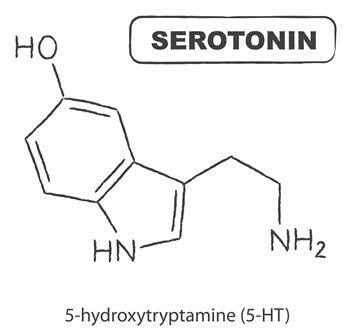
Introduction
Serotonin is known as the “happy” or “feel-good” hormone. It is synthesized when an amino acid, tryptophan combines with a chemical reactor known as tryptophan hydroxylase. When these two react together, they form serotonin (also 5-HT or 5-hydroxytryptamine).
Tryptophan is an essential amino acid. In other words, it cannot be produced in the body and must be made available through diet. Examples of tryptophan-containing foods include eggs, cheese, nuts, soy products, banana, turkey, salmon, and red meat. Serotonin is present in humans and can also be seen in fungi, plants, and animals.
In the human body, serotonin is found mostly in blood platelets, the gut, and the central nervous system (CNS). It is both a hormone and a neurotransmitter. It acts as a hormone in the periphery nervous system and functions as a neurotransmitter in the CNS. It is the most common neurotransmitter in the brain.
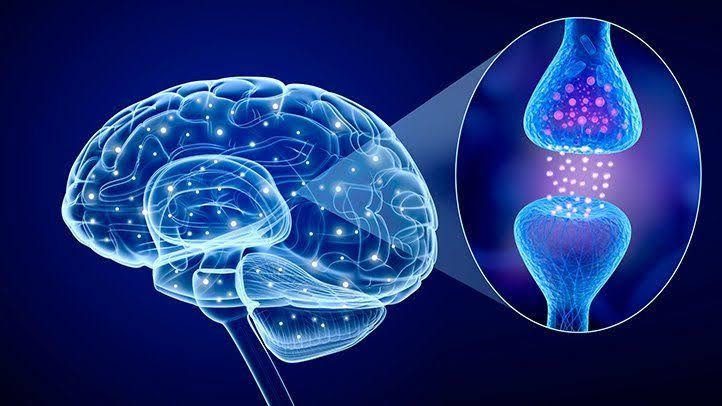
Serotonin is used to send signals between nerve cells and helps with our mood, emotions, appetite, sleeping, bone health, and digestion. Serotonin levels should normally fall between 101-283ng/mL (nanograms per milliliter). Low levels of serotonin produced in the brain can result in mood disorders, depression, and anxiety. However, when serotonin is present in excess amounts, it can lead to hyperactivity of the nerve cells.
Functions Of Serotonin
Serotonin works both in the CNS and the periphery. In the CNS, it is a neurotransmitter and relays messages between nerve cells and regulates their activity. Hence, it affects mood and feelings of well-being, fulfillment, and excitement.
Serotonin also influences the following:
- Sleep
- Cardiovascular health
- Bowel movement
- Appetite
- Nausea
- Wound healing and blood clotting
- Sexual function
- Bone health
- Neurological disorders
- Eye health
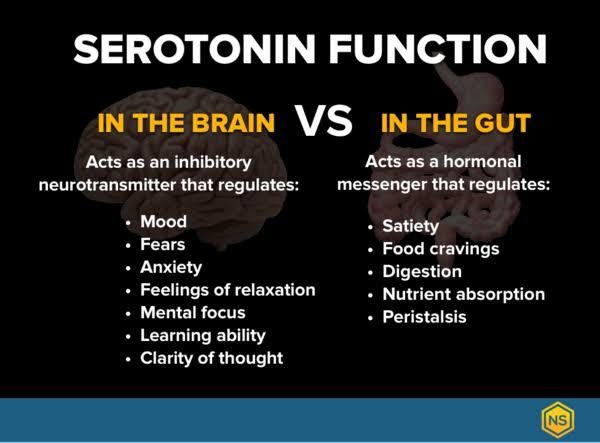
Mood
Serotonin is a mood stabilizer. It regulates your mood, feelings of happiness, and anxiety. A good mood makes you learn better, experience good memory function, feel calmer, happier, and less clumsy, and more emotionally stable.
When serotonin is too little in the brain, it may lead to depression. In higher concentrations, nerve cells begin to work excessively and there may be reduced arousal. Other mood and mental health disorders associated with serotonin include:
- Bipolar disorder
- Post-traumatic stress disorder (PTSD)
- Obsessive-compulsive disorder (OCD)
- Panic disorders
- Bulimia
- Migraine
Sleep
Serotonin controls when your sleep and when you wake up. It helps you have a good sleep by regulating your circadian rhythms. It does this by stimulating the areas of the brain responsible for either.
Cardiovascular Health
In the heart and blood vessels, serotonin is responsible for some effects. It can constrict and dilate blood vessels, and its effects can be complex. It can increase heart rate, increase the force of contraction, cause arrhythmias, coronary constriction, thrombosis, and fibrosis of cardiac valves. In low levels, serotonin can increase your chances of developing heart disease.
Bowel Movement
Serotonin is present in your gut-your stomach and bowel. It helps regulate your bowel movements in your digestive tract.
Appetite
Serotonin is produced in your brain. There, it stimulates the part of your brain concerned with appetite and helps to regulate your appetite.
Nausea
Serotonin stimulates nausea. When it is produced and in high amounts in the blood, the part of your brain that controls nausea gets stimulated. Then, you become nauseated. It helps to eject and remove foreign agents, toxins, contaminated food, amongst others from the body.
Wound Healing And Blood Clotting
When there is an injury, serotonin is produced by blood platelets. This causes the tiny arteries to narrow and reduce bleeding. Blood clots are then formed, and wound healing is enhanced.
Sexual Function
In low levels, serotonin can bring about an increase in sex drive (or libido). In excess amounts, there is reduced arousal and libido
Bone Health
When serotonin is produced or released too much in the body, it makes bones weaker. This results in bone degeneration and osteoporosis.
Neurological Disorders
Serotonin in altered levels influences feelings of anxiety, aggression, and stress. Imbalances in serotonin levels can result in neurological disorders. These include migraine, seizures and epilepsy, multiple sclerosis (MS), amyotrophic lateral sclerosis (ALS), autism spectrum disorder (ASD), and Parkinson’s disease.
Eye Health
Serotonin helps your eyesight. It enhances how visual stimuli are used and interpreted by your brain. In low levels, serotonin can cause blurred vision. In higher amounts, serotonin can result in dry eye and low tear production.
Problems Associated With Low Levels Of Serotonin
Serotonin is required at optimal levels for the normal functioning of the body. When it is too little in the brain and bloodstream, you may begin to experience several disorders. They may be physical, behavioral, mental, or emotional. They include:
- Anxiety
- Depression
- Irritability and aggression
- Poor appetite
- Insomnia or sleep difficulties
- Impulsive behavior
- Cravings for sweets and foods rich in carbohydrates
- Poor bowel movement and function
- Nausea
- Poor memory
- Suicidal thoughts and behavior
- Obsessive-compulsive disorder (OCD)
- Panic disorder
- Social anxiety disorder
If you notice or feel any of these symptoms above, seek medical attention immediately. Early diagnosis and treatment are important.
Problems Associated With High Levels Of Serotonin
Serotonin can be present in high amounts in the brain and body. It is known as serotonin syndrome. This often occurs when you are on serotonin medications such as SSRIs (selective serotonin reuptake inhibitors). They increase serotonin levels by preventing the reabsorption of serotonin in the body. Others include serotonin and norepinephrine reuptake inhibitors (SNRIs), monoamine oxidase inhibitors (MAOIs), migraine medications, certain pain medications, antidepressants, buspirone (BuSpar), trazodone (Desyrel), amongst others.
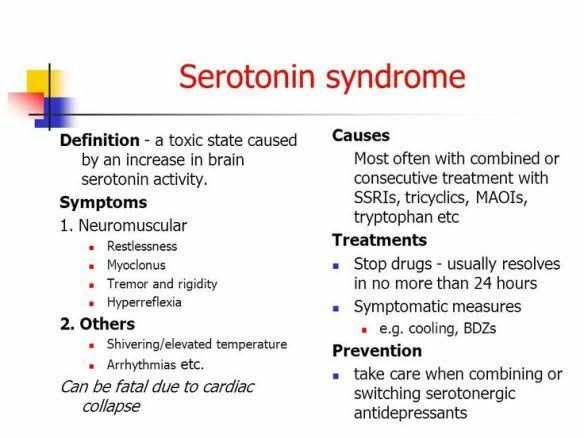
Symptoms that may be seen when serotonin is a little too much in the brain and blood include;
- Elevated mood
- Increased sweating
- Shivering
- Dry mouth
- Anxiety
- High blood pressure
- Rapid heart rate
- Restlessness
- Confusion
- Hallucinations
- Twitching muscles
- Headaches
- Diarrhea
- Dilated pupils
- Nausea
- Vomiting

In serious and extreme cases, the person may experience:
- High fever
- Irregular heartbeat
- Seizures
- Unconsciousness
you must seek emergency medical attention when you feel the above symptoms. You are at a higher risk of serotonin syndrome if:
- You use an increased dose of SSRIs and other medications that increase serotonin levels.
- Your drug regimen consists of more than one drug to increase serotonin levels.
- You use herbal supplements or unprescribed drugs that increase serotonin levels.
Natural Ways To Increase Serotonin
Serotonin deficiency can be corrected naturally without medications. The following are ways by which serotonin levels can be increased naturally:
Improve Your Diet
While serotonin cannot be directly gotten from the diet, tryptophan that is required for its synthesis can. Tryptophan is an essential amino acid (blocks used to build protein) and can be found in protein-rich foods. This includes the following: eggs, cheese, salmon, tofu, turkey, and nuts and seeds. Fruits such as bananas and pineapples are rich in tryptophan.
However, tryptophan cannot cross the blood-brain barrier so the serotonin needed by the brain needs to be produced in the brain. The blood-brain barrier is a protective sheath around your brain that permits the passage of certain things. Unfortunately, tryptophan is not always lucky.
However, eating tryptophan-rich foods with carbohydrates helps to get more tryptophan into the brain. This is because eating carbs allows the body to produce more insulin, which promotes amino acid absorption. Examples of healthy carbs to serve with tryptophan-rich foods are oatmeal, whole-wheat bread, and brown rice.
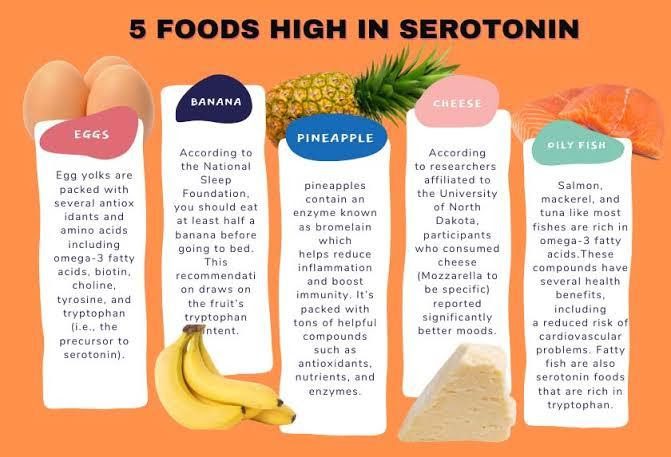
Avoid a high-sugar diet. A high sugar diet lowers serotonin metabolism and reduces the effectiveness of serotonin receptors. The receptors affected mostly are the somatodendritic serotonin-1A receptors which provide feedback control in the production and release of serotonin.
Adding foods rich in vitamins B6 and B12 to your diet help increase the production of serotonin naturally. Foods rich in these vitamins include whole grains, nuts and seeds, bananas, avocados, cauliflower, cabbage, legumes, brussels sprouts, and broccoli.
Eating a diet rich in fiber can help increase the good bacteria in your gut. They help boost serotonin levels through the gut-brain axis. Probiotics and fermented foods can also fuel useful gut bacteria.
Limit Your Caffeine And Alcohol Intake
Cut down on your caffeine intake. This includes reducing how much you take coffee, caffeinated beverages, and food items like sweets and chocolates. While caffeine can give you spurts of energy, it causes sudden drops in your body’s serotonin levels once its effects wear off.
In addition, watch how you drink alcohol. Alcohol alters the production and function of serotonin in the brain. It also reduces the level of serotonin in your body.
Exercise Regularly
Exercise stimulates the release of tryptophan into your blood. Studies also show that exercise allows more tryptophan to pass the blood-brain barrier. This is made possible by the following means:
- It activates your muscles which makes tryptophan more available to cross the blood-brain barrier (BBB).
- It reduces the number of other amino acids that are trying to cross the BBB.

Exercise has also been shown to have antidepressant effects and can be used to treat depression. The type of exercise that increases serotonin is aerobic exercise. They include running, brisk walking, swimming, cycling, jogging, light hiking, and dancing. They get your heart rate up and with at least 30 minutes of aerobic exercise, you can achieve the serotonin “high’. Research shows that anaerobic exercises such as jumping rope, weight lifting, and stair training can increase serotonin levels, but not as much as aerobic exercises.
Get More Exposure To Sunlight
Studies show that serotonin levels are higher in summer and fall, and lower during winter. This is proven by the low moods and mood disorders experienced more during cold seasons such as seasonal affective disorder (SAD), panic disorder, and generalized anxiety disorders.
Exposure to sunlight can help increase serotonin levels, and you can achieve this by:
- Spending at least 10-15 minutes outside every day
- Performing exercise or physical activity outside
- Use a light therapy box if it’s winter, rainy season, cannot go outside, or is at risk for skin cancer. Consult with your doctor before using a light therapy box if you have been diagnosed with bipolar disorder. It may trigger mania. For best results, use it for 20 to 30 minutes of the first hour of waking up every day. Stand at a distance of 2 feet from the light without looking at it directly.
Exposure to bright light during the day can boost your serotonin levels, stabilize your mood and help you sleep better at night.
A study found out that vitamin D, which can be gotten from sunlight increases the production of serotonin. Vitamin D helps stimulate the gene that synthesizes tryptophan hydrolase 2 (TPH 2) which combines with tryptophan to form serotonin.
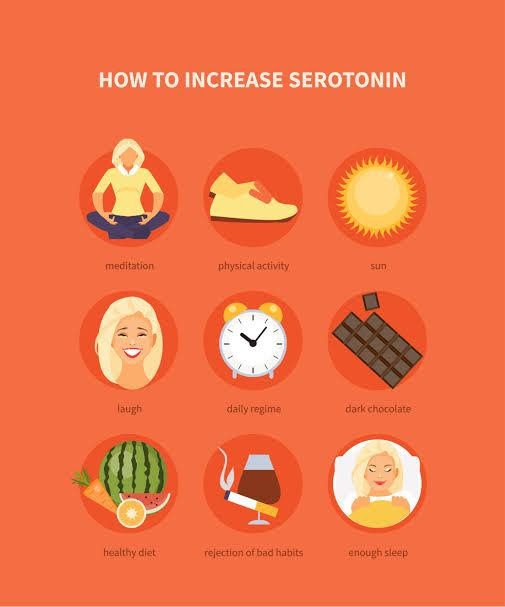
Get A Good Night’s Sleep
An antidote to stress and exhaustion is sleep. When you sleep and are relaxed, your body produces more serotonin, and cortisol levels in the body are reduced. Poor sleep results in desensitization of the serotonin receptor system. When that happens, it takes time for it to return to its normal function and you are at a higher risk for depression.
Try Massage
Research shows that massage therapy helps increase serotonin levels up to 30% in the body. It also increases dopamine, another neurotransmitter that helps mood, and reduces cortisol, a hormone that helps your body cope with stress. Thus, massage helps you relieve anxiety and depression.
Meditate
According to research, meditation helps to increase your serotonin levels by relieving stress and improving your mood. 10 minutes of meditation per day is helpful to boost your serotonin levels. It is one of the simplest ways to boost your serotonin levels naturally.
A study compared a group of people who had 30 minutes of meditation every day for eight weeks to a group that didn’t and reported a reduction of gray matter in the amygdala of people in the first group. The amygdala is the part of the brain that is linked with fear, anxiety, and stress.
Listen To Music
Listening to music helps elevate your mood, makes you feel calm, relaxed, and happy. That is because it helps boost serotonin levels in the brain.
Try Mood Induction
Being in a good mood can help increase the serotonin levels in your brain and body. Mood induction involves you thinking about something that makes you happy and feels good; anything that makes you positive. It helps the production of serotonin in your brain, and in turn, enhances your mood. Several ways to improve your mood include:
- Visualizing a sweet experience you once had.
- Focusing on positive events around you.
- Going through old photos or albums that captured moments and people that make you happy. It could be friends, family, a vacation, a favorite place, an excursion or visit to certain places, an event, a pet, etc.
Use Supplements
Certain supplements can help increase serotonin levels in the shortest time possible. They provide and increase tryptophan, needed to produce serotonin. However, consult your doctor before taking any supplement, especially if you are on a prescribed regimen. Some supplements that can boost serotonin levels include SAMe (S-adenosyl-L-methionine), 5HTP, and St. John’s Wort.
Conclusion
Serotonin, the “happy hormone” is important to normal physical and psychological functioning. Alterations in levels can result in disorders that can be life-threatening. See a doctor if you notice or feel any strange or worrisome symptoms. You can boost your serotonin levels naturally through a healthy, balanced diet, regular exercise, getting enough sleep, exposure to sunlight, and doing things that can enhance your mood.
Sources:
https://www.healthline/health/how-to-increase-serotonin
https://www.medicalnewstoday.com/articles/how-to-increase-serotonin
https://carex.com/blogs/resoures/how-to-increase-serotonin


